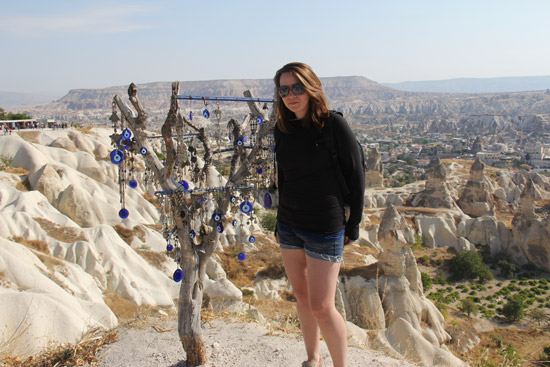Tips for Women Traveling in Turkey
One tourist says Turkey may be the friendliest nation she’s experienced. Another was called a “witchy woman.” What’s your experience?
/https://tf-cmsv2-smithsonianmag-media.s3.amazonaws.com/filer/20111020100015JuliaPasternack-womens-travel-web.jpg)
In the Turkish village country, women almost never talk to strange men on touring bikes. No matter how sincerely I may say, “Merhaba!” women young and old usually look meekly at their feet as I pass, leaving my voice hanging in the mountain air. I think it’s safe to conclude that Turkish society teaches women not to commune with outsiders, and I’ve often wondered what life is like for these women behind closed doors.
I’ve also wondered how Turkish society regards female travelers, given that an independent woman journeying through strange places on her own must be a very alien concept here. A young Canadian backpacker named Sarah Rome, who I met one evening on the road between Ephesus and the Grotto of the Seven Sleepers, gave me some insight. For one thing, Sarah said she’s had much the same experience as me in relating to Turkish women.
“They won’t have anything to do with us, either,” she told me.
I asked how the men, as a whole, have treated her.
“It’s hard to know which ones are just being friendly or which ones are going to eventually ask, ‘Hey, you want to come with me to my carpet shop?’”
But many men are, of course, only being kind, and Sarah said that of the many regions in which she has traveled alone, including Southeast Asia, Turkey may be the friendliest nation she’s experienced. Word may be spreading, too, that Turkey is a hospitable land for travelers, for I’ve met quite a number of solo women wanderers here—and I hardly meet any tourists at all. For instance, in Sofia I met Julia Pasternack, a Los Angeles native now of Georgia. Julia had just finished a midsummer tour of Turkey and, given the weather, had been showing “a lot of skin,” she says. Nonetheless, men kept their eyes to respectful glances and they kept their hands off of her–except for two furtive fellows on a crowded tram in Istanbul and a teenage boy at a bus station in Cappadocia.

Stranger in an even Stranger Land: Canadian Sarah Rome stands beside a so-called "evil eye tree" in the Pigeon Valley of Cappadocia.
“Compared to my extensive travels within Latin America, I would say that the men in Turkey weren’t all that sexually aggressive,” Julia wrote me in an email, and she feels that women can travel alone here safely as long as they take caution at night and “stay in tourist spots.”
Australian traveler Kate Louden was so impressed by the feeling of safety in Turkey during a solo backpacking tour in the summer of 2010 that she wishes, in hindsight, she had ventured into the reputedly wilder eastern regions of the country. Instead, she remained in the west and eventually moved on to Spain. She remembers mostly the generosity and sincerity of the Turkish people (and by “people” we mean “men”; the women, Kate says, “would stay away.”) On several occasions, kind police officers drove Kate out to distant ruins for private first-class tours. And once, as she struggled to climb out of a pit at the Cennet & Cehennem sinkholes—meaning “Heaven & Hell”—near Silifke, a Turkish man took notice and offered his hand, saving Kate the nuisance of having to crawl to dry ground on hands and knees.
But in the tourist trap towns of the west coast, men could be foul and forward, Kate says. More than once at bus terminals she was called a “witchy woman”—which in these parts seems to be a grave insult to hurl at a lady. In Istanbul, Kate bought a wedding band that she thought might fend off male pests, but it was as ineffective as a string of garlic on a surfer might be against a great white shark. She was told by a man (outside a carpet shop) that wedding rings are useless; only the husband himself holds the power to deflect the advances of a Turkish man. The same carpet dealer then demonstrated this said disregard for wedding bands; he told the ostensibly married Kate that he bore magic healing powers that he could apply—but due to some technical glitch they would only work if she took off her clothes. A clever devil he was! But Kate was cleverer still, and she departed with some wisdom and experience gained. She concedes reluctantly that, in the future, she may travel Turkey accompanied by a man, if only to avoid harassment.
But this might produce its own complications. Our recurring voice of wisdom—that of my friend Irem Durdag—says she once traveled the Black Sea coast with a boyfriend. Some more conservative Turkish folks, Irem says, have a narrow view of the world in which there is little space for beginning, intermediate or advanced stages of romance; people should either be married or not married. So Irem and her boyfriend told tut-tut-tutters that they were fast engaged, which they weren’t. They also had to sleep in separate hotel rooms.
Every day, I make mouths drop and eyes open by simply riding a bicycle through a village. Often, intrigued people swarm me in groups (a friendly, if sometimes annoying, quirk of traveling here), and I’ve been overwhelmed with small gifts and generosity so sincere it could make my heart lurch. All of which has me wondering: How would the same people react if a woman—or two or three—passed through on loaded touring bicycles?
Women with any such insight into this or other questions about traveling in Turkey, please add your comments below.
/https://tf-cmsv2-smithsonianmag-media.s3.amazonaws.com/accounts/headshot/Off-Road-alastair-bland-240.jpg)
/https://tf-cmsv2-smithsonianmag-media.s3.amazonaws.com/accounts/headshot/Off-Road-alastair-bland-240.jpg)